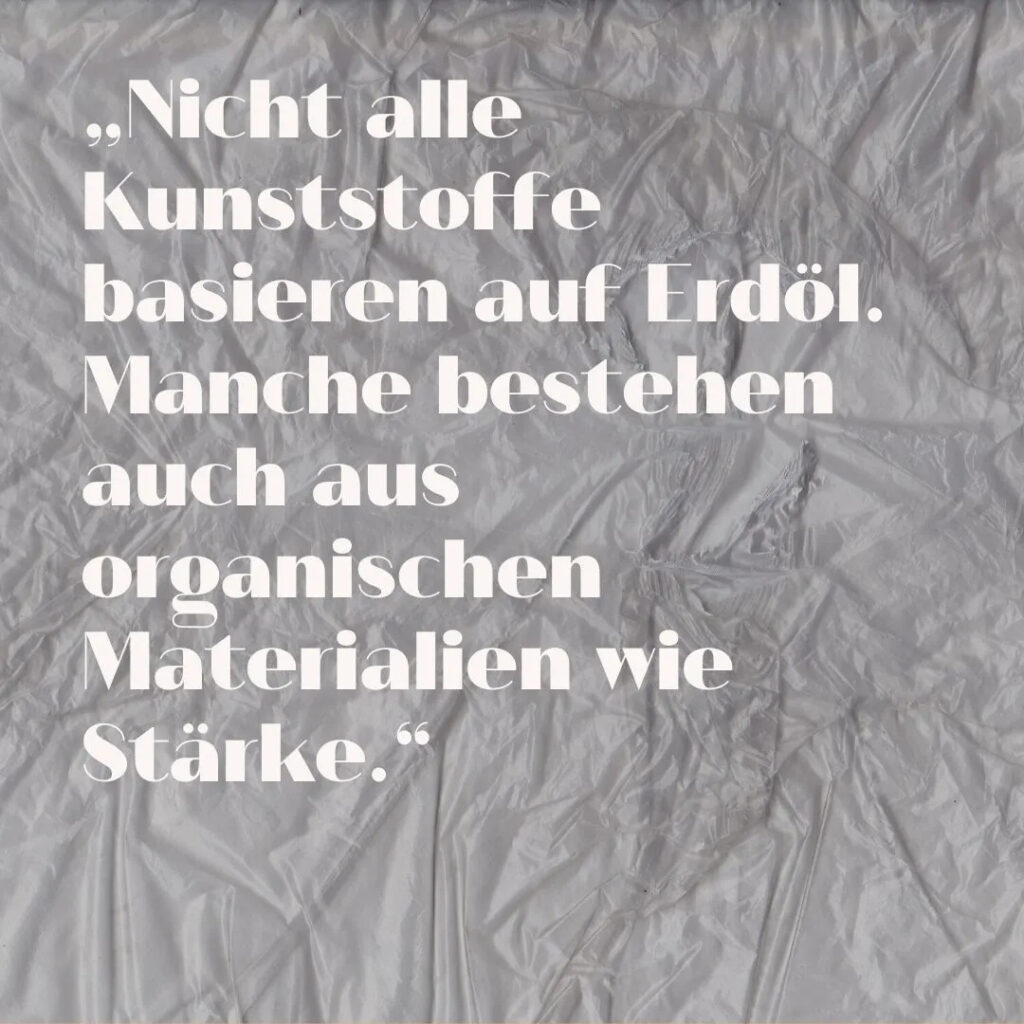Startseite » BIOvative Magazine » Biologisch abbaubar, kompostierbar, biobasiert, recyclebar – Bedeutung und Unterschied
Table of contents
- Plastics - the difference is in the details
- From biodegradable to recyclable - the differences at a glance
- Biodegradable - decomposition without time pressure
- Compostable - decomposition with announcement
- Bio-based plastics - from renewable raw materials
- Recyclable plastics - recycling as a deceptive package
- With BIOvative into a sustainable future

Biologisch abbaubar, kompostierbar, biobasiert, recyclebar – Bedeutung und Unterschied
- 7. September 2023
- Autor: Uwe Friebel
- Lesezeit: 9 Minuten
In the world of sustainability, you’re confronted with terms like “biodegradable,” “compostable,” “biobased” or “recyclable” at every turn. But what do these terms actually mean? It often sounds as if the various terms can be used synonymously. In fact, however, there are detailed differences between the individual terms. Let’s take a look at where the differences lie!
Plastics-the difference is in the details
Before we clarify how the individual substances differ in detail, we need to clarify what we are talking about. Whether biodegradable, compostable, bio-based or recyclable: all these terms refer to plastics. Many items in our everyday lives are made from plastics. These include, for example, garbage bags, films, tableware, but also clothing and even furniture are made of plastic.
The German Plastics Museum defines plastics analogously as follows:
Plastics are substances that are specially made by specialists for a specific purpose. They are made of artificial polymers that can be assembled into a wide variety of substances in different forms by means of chemical reactions.
Polymers are long chains of atoms and molecules that hang together in threads. The trick is that not all plastics are based on petroleum. Some are also made from organic materials such as starch. The exact chemical composition of individual plastics can vary considerably. This is precisely why plastics can be divided into “biodegradable” and “non-biodegradable”.

From biodegrable to recyclable - the differences at a glance
biodegradable:
- The substance is decomposed in a biological process that cannot be controlled.
- Does not mean that the fabric is also compostable.
- The term may also be used for petroleum-based plastics, but this creates the controversial microplastic.
compostable:
- The plastic is biodegraded via a human-controllable process (e.g. in industrial composting plants).
- All compostable plastics are also biodegradable.
biobased:
- Not all bio-based plastics are also biodegradable.
- Plastics can be labeled as biobased if they contain only 40 percent renewable raw materials.
recyclable:
- No biodegradation process, but industrial recycling
- Most packaging disposed of through the yellow bag cannot be recycled.
- Plastics that cannot be recycled are incinerated.
We will now explain what the terms mean in detail:
Biodegradable - decomposition without time pressure
Biodegradable plastics include, for example:
- thermoplastic starch
- cellulose
- degradable polyester
- polylactide
The German Institute for Standardization (DIN) defines what exactly is meant by biodegradable plastics. The definition reads analogously:
Biodegradable plastics are plastics that are recycled by biological processes. This means that microorganisms such as bacteria or fungi can decompose these substances into waste products such as carbon dioxide (CO2), water, salts and biomass both in the air and without the addition of oxygen.
The devil is in the details here: The labeling as “biodegradable” says nothing about the amount of time it takes for the substance to completely decompose. This means that even if microorganisms need years or decades to recycle the substance, the plastic is still considered biodegradable.
This is how biodegradation works
- First, bacteria change the structure of the starting material so that it can be utilized by other microorganisms.
- When the substance is broken down, the so-called metabolites are formed. These substances are broken down in finer steps into smaller and smaller waste products.
- In the last step, mineralization, water, carbon dioxide (CO2), mineral salts and biomass are finally produced.
Whether a plastic is biodegradable does not necessarily depend on the material, but on the chemical structure of the substance. This means that plastics produced on the basis of petroleum can also be biodegradable under certain circumstances. These substances are referred to as oxo-degradable plastics.
The catch with oxo-degradable plastics
Oxo-degradable plastics are based on fossil fuels and substances that change their chemical structure when exposed to light, causing the material to decompose. However, microplastics are produced in the process, which end up in the environment and have now even been detected in human blood and breast milk. Since microplastics are highly controversial due to their effect on humans and animals, even the EU Parliament is in favor of a ban on oxo-degradable plastics.
Because biodegradable plastics are not suitable for the composting plant, corresponding packaging often ends up in the yellow garbage can or the yellow bag. Due to certain additives, however, they can render the recyclable mass unusable in recycling. This means that the mass is ultimately only suitable for incineration.
Compostable - decomposition with announcement
If a plastic is compostable, this means that the material can be biodegraded within a fixed period of time and under certain conditions. Unlike biodegradable materials, the composting of plastics is a human-controlled process.
Additives in compostable plastics must not exceed 1% of the initial mass. In addition, the plastics must be non-toxic and have no negative effect on plant growth. The small but important difference is that every compostable plastic is biodegradable. But not every biodegradable plastic is compostable.

The German Institute for Standardization awards two different certificates for compostability:
- Compostable in industrial composting plant: According to DIN EN 13432, the plastic must be decomposed in an industrial composting plant at 60°C within three months. A maximum of 10 percent of the biomass may remain when the residues are pressed through a sieve with a 2-millimeter opening. Materials that meet these requirements can be awarded the "Keimling" or "OK Compost INDUSTRIAL" certificates.
- Compostable in the garden compost: Plastics with this certificate or the "OK Compost HOME" certificate are allowed in the garden compost. There they must decompose within one year at an ambient temperature in the compost of 30°C.
If plastics are certified as “compostable”, this does not mean that you can simply leave them in the wild. For composting to start, certain conditions must be met that you won’t find in a meadow or forest.
Bio-based plastics - from renewable raw materials
Plastics that are partly made from sustainable raw materials are referred to as bio-based. This means that the raw materials grow back in whole or in part. These include wood, corn starch or oilseeds. The definition can be found in DIN 16575 of the German Institute for Standardization.
Above you have learned that it depends on the chemical structure of a substance whether it is biodegradable. Unfortunately, this also means:
Not all bio-based plastics are also biodegradable.
One of the reasons for this is that a plastic can be labeled as biobased if it contains only 40 percent renewable raw materials.
- Furniture made of wood chips and composites are biobased but not biodegradable.
- Disposable tableware made from corn starch is bio-based AND biodegradable.
Recyclable plastics - recycling as a deceptive package
The recycling process provides for the reprocessing of discarded materials into a new product. This is preceded by shredding or melting down the original product, leaving the recovered recyclable material. However, there is a catch.
Most of the packaging that is disposed of via the yellow bag often cannot be recycled in the form of new products. Often, the packaging is so contaminated that it cannot be shredded and melted down accordingly.
Plastics that cannot be clearly sorted out and cleaned in the recycling plant go into so-called energy recovery. This means that the waste is incinerated. For waste incineration, however, it is stipulated in Germany that the resulting energy must be used industrially. This takes place, for example, in the form of electricity generation.
The term recyclable is not protected and therefore not standardized. For you, this means in practice:
You don't know beforehand whether the packaging will really be recycled or just incinerated in the end.
With BIOvative into a sustainable future
Our wide range of bio-film garbage bags is fully compostable and biodegradable within 6 weeks in an industrial composting plant. So our garbage bags help you to do something good for the environment in everyday life.

Uwe Friebel

Uwe Friebel
These articles may also interest you

DINplus organic waste bag certification – for a clean garbage can
Content DINplus organic waste certification Advantages of DINplus certification Requirements of the DINplus certificate The certificate DINplus in detail Compostability at DINplus Basis for certification

Ocean Plastic: Greenwashing oder Lösung gegen die Plastikflut?
Content We are suffocating in plastic waste What is “Ocean Plastic” and how does it contribute to solving the crisis? How can plastic be recycled?

Klimaschutzklage: Wie gut stehen Deine Chancen, erfolgreich eine lebenswerte Zukunft einzuklagen?
Content The most important facts about the climate protection lawsuit Your right to climate protection The legal basis for the climate protection lawsuit Liveable future


